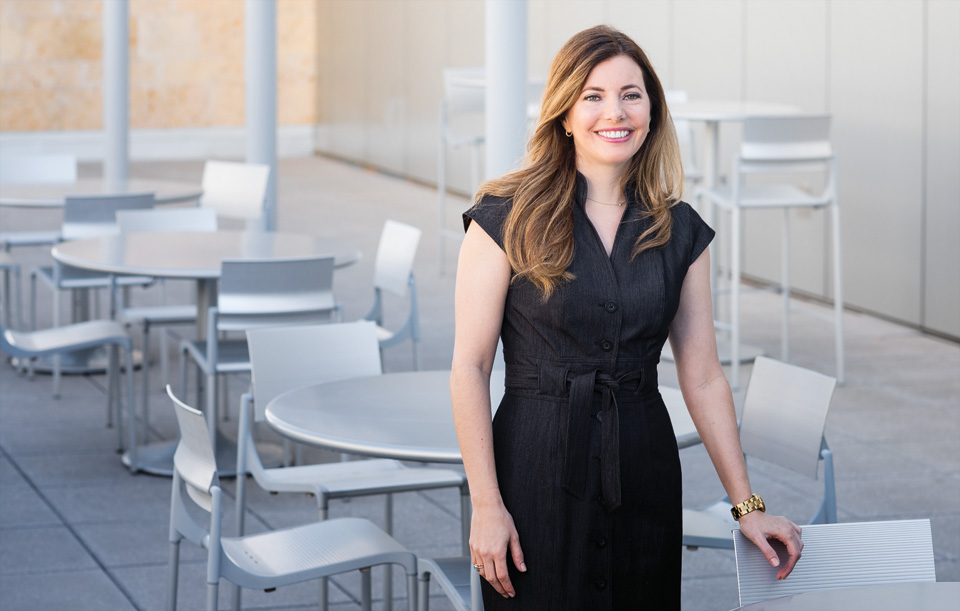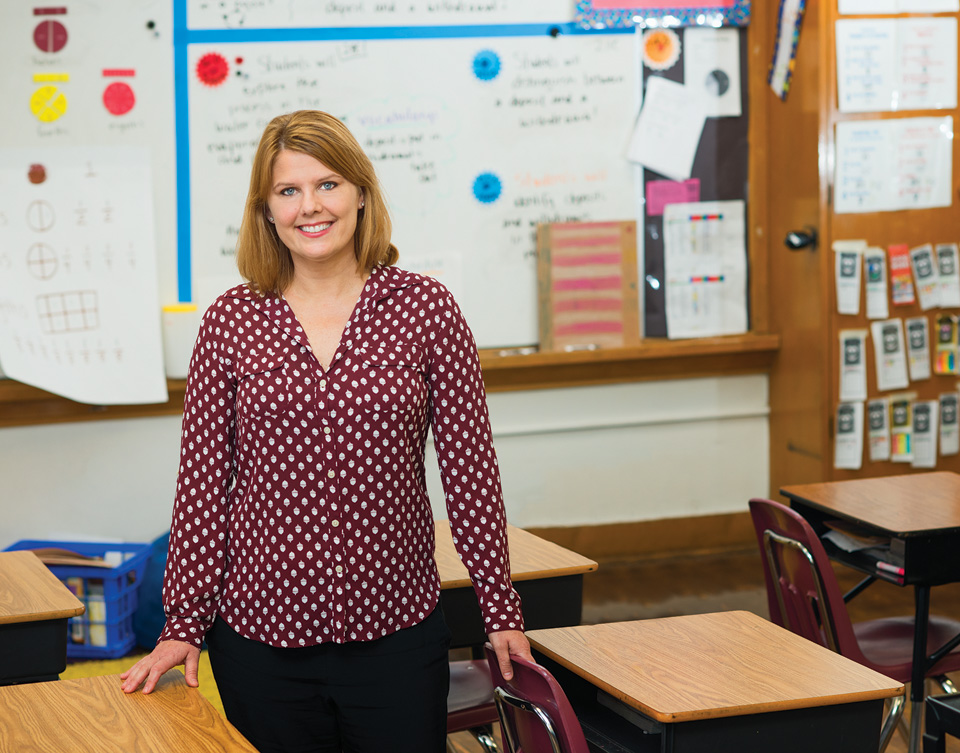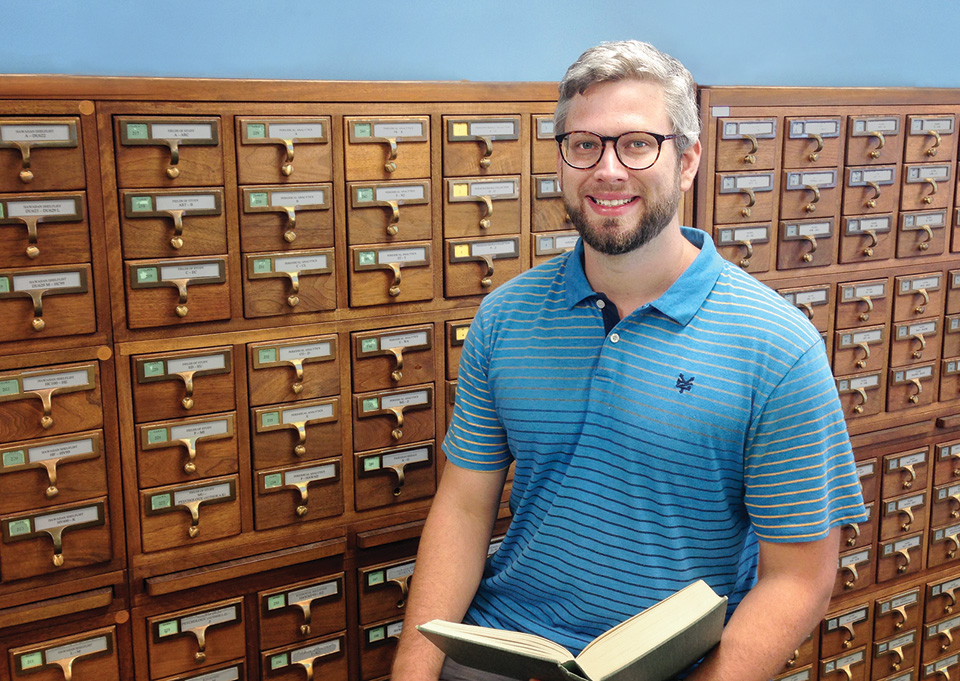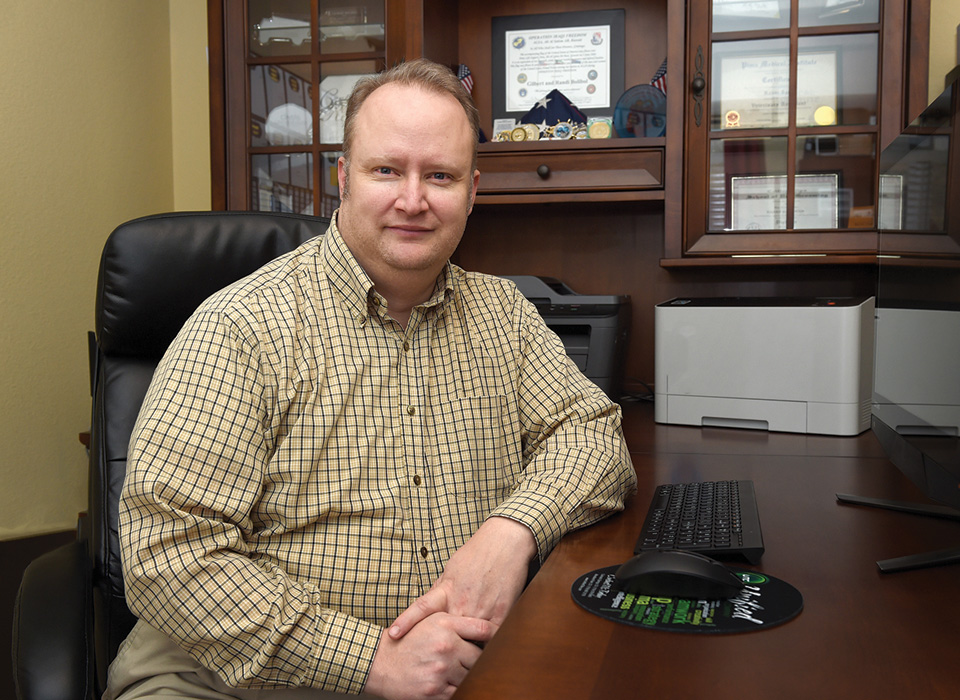UNT linguistics alumni bring meaning to human language, preserve history and improve
communication.
March 30, 2017
When you pick up the phone to call a customer service representative at the bank, you're
often greeted by an automated system rather than a human. If you move quickly through
the prompts and receive the information you need before getting the urge to hang up,
it may be thanks to a linguist.

Julie Underdahl ('98, '00, '02 M.A.) (Photo by Ahna Hubnik)
Julie Underdahl ('98, '00, '02 M.A.), who earned her master's degree in linguistics from UNT, designs such automated systems for corporations and government agencies as a voice user interface designer for Genesys, a California-based telecommunications company. By phrasing questions in a specific manner, she can prompt the caller to answer in a way the computer can quickly process.
"Speaking is innate and we're all wired for speech," she says. "I anticipate the nuances of each question and tailor each system to the specific industry, dialect and typical caller population."
Students in UNT's Department of Linguistics in the College of Information investigate how languages are structured, used and related and how they vary and change over time. In addition to syntax and semantics, which Underdahl examines in her work, areas of study include language acquisition, phonetics, sociolinguistics, language documentation, poetics and computational linguistics.
Fields that benefit from linguistics expertise are just as varied. Kristan Taylor ('92, '01 M.A.) teaches bilingual math and science in Dallas ISD, while Peter Schuelke ('10, '13 M.A.) studies and documents endangered languages. And Marc Feickert ('93 TAMS, '00) works in United Healthcare's data management group, building language models for computer programs.
"Linguistics is the ultimate interdisciplinary field. Everything involves language -- knowing the structure and how it is used benefits many areas," says Patricia Cukor-Avila, interim chair of UNT's linguistics department. "The application of linguistics is broad and evolving. Computational linguists play a role in making inventions such as Siri a reality. There are job opportunities with the CIA, in human resources and corporate training, in overseas teaching and speech-language pathology."
Crafting the perfect call
To elicit a customer response the computer can understand, Underdahl uses widely known ideas, like mimicking, in the phrasing of automated questions. The 13-year veteran in the speech technology field also coaches voice actors who record the messages, because something as simple as a change of pace or rewriting a prompt to begin with the word "which" can affect the responses from callers.
"Just by changing language and intonation," she says, "you can change from a 'yes/no' connotation to an 'and/or,' which changes the entire meaning of the question."
Underdahl, who also received two bachelor's degrees from UNT in biology and Spanish, decided to pursue a master's in linguistics after meeting numerous individuals who spoke multiple languages on a European backpacking trip.
"I had never traveled or encountered people who were multilingual before and I became fascinated with languages -- especially how people learn them," she says.
Underdahl spent five months teaching at the American Language Center in Casablanca, Morocco, through a UNT exchange and one year as an English as a Second Language instructor for UNT's Intensive English Language Institute -- experiences that later fostered her linguistics career.
Her role as a voice user interface designer is complex, but the challenge of designing a perfect system for each business and its customers is something she loves.
"My job is a great blend of art and science," Underdahl says.
Building connections

Kristan Taylor ('92, '01 M.A) (Photo by Ahna Hubnik)
Soon after Kristan Taylor was hired to teach elementary school science in 1997, a principal informed her she'd also be responsible for teaching ESL. Unfamiliar with the course, Taylor asked for information and was told, "It's the same as standard classes, you just have to talk slower."
Certain that talking slowly wasn't the one-size-fits-all answer for helping non-native English speakers, Taylor returned to UNT to pursue a master's in ESL, one of four graduate degrees and certifications offered by UNT's linguistics department. She wanted to offer her students tailored and effective instruction.
"In the '90s, it was common for people to think modifying lessons here and there was all that needed to be done in the field of ESL. That is not the case," says Taylor, a second-grade bilingual educator. "Effective instruction requires advanced awareness of the structure and function of English. You have to break words and phrases down to make them comprehensible."
Taylor says her linguistics professors, especially Cukor-Avila, encouraged her to take advantage of study abroad opportunities as a graduate student.
"I completed a teaching practicum in Morocco that opened so many doors for me. I learned some French and a little bit of Arabic, and how to immerse myself into a new culture," Taylor says. "That was the stepping stone for my career."
She also worked one year as an English language fellow for the U.S. Department of State in Albania and spent four years in Toluca, Mexico, as program coordinator of a UNT-Universidad Autónoma del Estado de México exchange program.
"After living in Mexico and collaborating with their education system, I was inspired to work with kids in my own community who are learning English," she says. "The linguistics department brought together my love of travel, poetry, literature, language and different cultures."
Documenting dialogue

Peter Schuelke ('10, '13 M.A.) (Photo by Dave Oka)
As a master's linguistics student at UNT, Peter Schuelke found his life's calling when he learned that 60 to 90 percent of the world's 7,000 languages are anticipated to be extinct within 100 years.
"It's an extreme situation. I want to spend my lifetime collecting data on undocumented and endangered languages," says Schuelke, one of eight from his master's cohort to advance to a Ph.D. program.
He began his research on Roviana, a nearly undocumented language in the Solomon Islands, as part of the Endangered Language Documentation Theory and Application research group at the University of Newcastle in Australia.
He spent a year as a visiting fellow at Harvard University's Polinsky Language Sciences Lab while also completing graduate coursework at MIT, including a seminar taught by Noam Chomsky. He currently studies alongside UNT classmate Alex Smith ('11, '12 M.A.) at the University of Hawaii at Manoa.
Schuelke's work on Roviana syntax focuses on grammatical relations and voice alternations. The patterns displayed in Roviana have not been found in other languages.
His passion for language documentation was sparked by UNT Distinguished Professor Tim Montler, who has received National Science Foundation funding to preserve American Indian languages and extensively documented those languages.
"Studying phonology and sound systems with Dr. Montler, solving a language system puzzle and reporting on others' research inspired me for the challenge of documenting an undescribed language," Schuelke says.
Designing search systems

Marc Feickert ('93 TAMS, '00) (Photo by Gil Bolibol)
Marc Feickert has made a career applying his linguistics knowledge to a company's mission to yield positive results.
Though UNT hadn't introduced a bachelor's degree in linguistics during his undergraduate years, he took numerous classes with Distinguished Research Professor Haj Ross and other linguistics faculty while completing a degree in English composition and language.
"Haj encouraged me to focus on studying what I love," says Feickert. "He connected with us and taught great classes."
Feickert entered the technical communication field as a proofreader and editor for a genealogical software company. He soon was responsible for setting up the database in a way that would work for multiple languages.
"Working in mainstream businesses, I've applied my linguistics skills to show that there is a specialized way to use software that could put them ahead of their competition," he says.
He uses syntax -- how words combine to form phrases, phrases to form clauses, and clauses to form sentences -- to build search architecture in software that can be replicated in different languages.
"Regardless of what make a car is, a mechanic can determine how to troubleshoot a problem because cars are the same model, globally," Feickert says. "Languages are built the same way, too. They all have the same components like phonology, syntax and semantics."